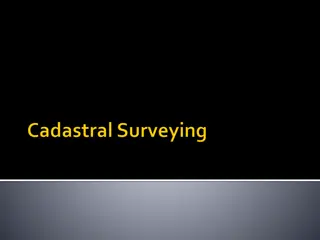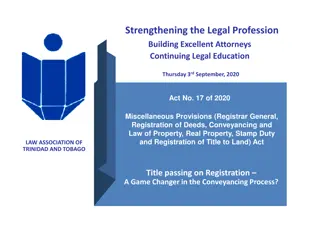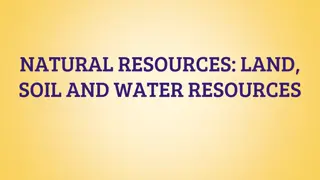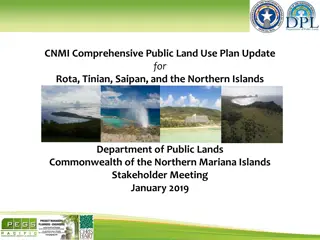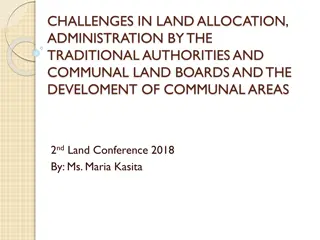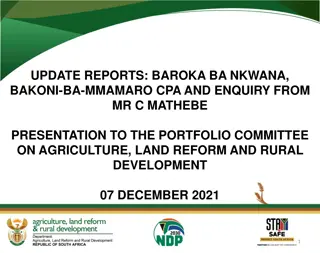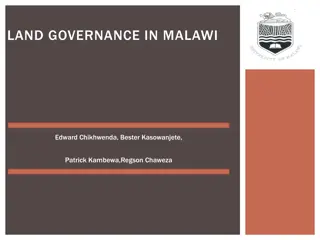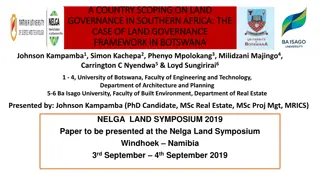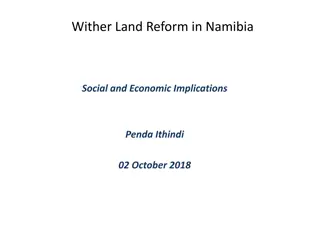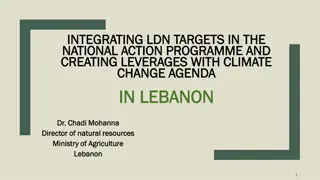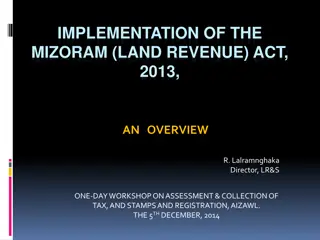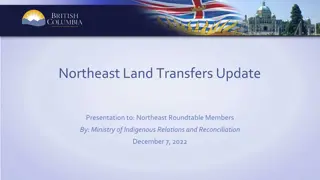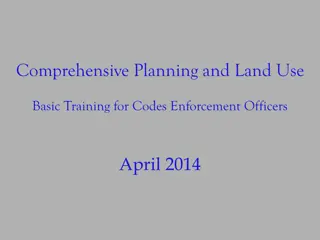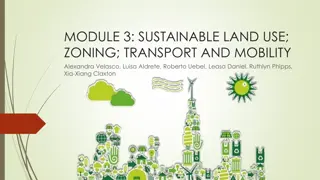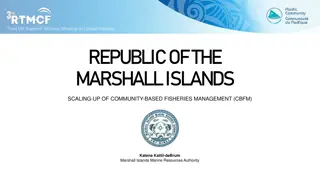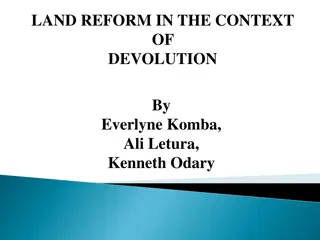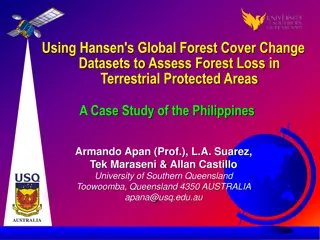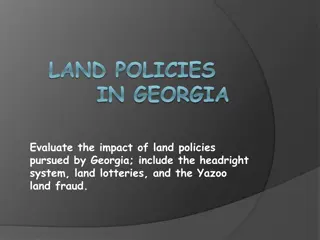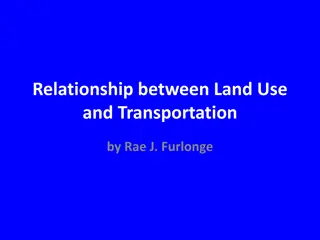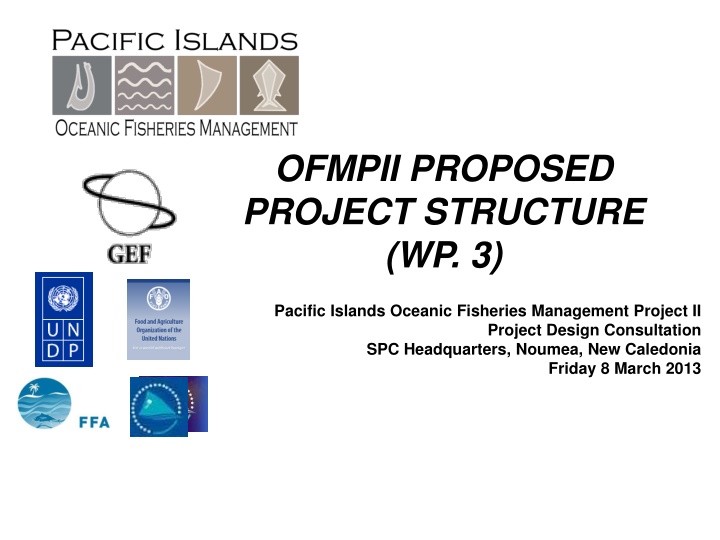
Sustainable Land-Use in Protected Areas Workshop
This workshop conducted in 2014 at the Hanse Institute for Advanced Study in Delmenhorst, Germany, focused on sustainable land-use practices in protected areas. Topics discussed include aspects of sustainability, different forms of land-use, effects on biodiversity and socio-economics, and ways to measure sustainability. The workshop also explored linkages between sustainable land-use and research fields related to protected areas, such as tourism, regional economy, cultural heritage, and governance. Participants delved into questions of decision-making, factors influencing sustainable land-use, and the roles of various stakeholders.
Download Presentation

Please find below an Image/Link to download the presentation.
The content on the website is provided AS IS for your information and personal use only. It may not be sold, licensed, or shared on other websites without obtaining consent from the author. If you encounter any issues during the download, it is possible that the publisher has removed the file from their server.
You are allowed to download the files provided on this website for personal or commercial use, subject to the condition that they are used lawfully. All files are the property of their respective owners.
The content on the website is provided AS IS for your information and personal use only. It may not be sold, licensed, or shared on other websites without obtaining consent from the author.
E N D
Presentation Transcript
OFMPII PROPOSED PROJECT STRUCTURE (WP. 3) Pacific Islands Oceanic Fisheries Management Project II Project Design Consultation SPC Headquarters, Noumea, New Caledonia Friday 8 March 2013
1. 2. 3. 4. 5. Project Outline Objective Components Projected Outcomes and Planned Outputs Budget Summary
Project Outline Title: Implementation of Regional and Global Oceanic Fisheries Conventions in the Pacific Islands. GEF Implementing Agencies: FAO and UNDP Executing Agencies/Partners: FFA, in coordination with SPC and PNA, PITIA, TVM and WWF (no IUCN) Countries in which the project is being implemented: Cook Islands, FSM, Fiji, Kiribati, RMI, Nauru, Niue, Palau, PNG, Samoa, Solomon Islands, Tonga, Tuvalu and Vanuatu (not Tokelau) How Much: US$10.0 million How Long: 4 years When: plan for activities to begin Oct-Dec 2013
Origin of OFMPII Pilot phase $3.5m for oceanic fisheries, 2000-3, part of IWSAP Project (Drew s Project) support conclusion of the WCPF Convention OFMPI, 5 years, $10.9m +$700K design & bridging support bringing the Convention into force, establishing the Commission, & strengthening national programmes OFMPII 2010 (false) start, 5 years, $13.7m, UNDP, Tokelau in Proposed to implement WCPFC measures 2012, 4 years, $10.0m, new sub-regional component, FAO in To support SIDS meeting obligations to implement and enforce . global, regional and sub-regional arrangements
Project Objective To support Pacific SIDS in meeting their obligations to implement and effectively enforce global, regional and sub-regional arrangements for the conservation and management of transboundary oceanic fisheries thereby increasing sustainable benefits derived from these fisheries
Implementing Agencies Executing Agencies/Partners COMPONENT TITLE GEF Grant UNDP FFA 1. Regional Actions for Ecosystem- Based Management Except some climate change work (FAO) Except some climate change work (SPC) 1,610,350 2. Sub-Regional Actions for Ecosystem- Based Management FFA FAO 2,000,000 With PNA & TVM SPC (IMS, monitoring, science) FFA (law, MCS, policy) 3. National Actions for Ecosystem- Based Management FAO UNDP 4,439,720 FFA 4. Coordination and Knowledge Mgmt UNDP 1,474,930 With PITIA & WWF UNDP FFA 475,000 5. Project Management $10,000,000 TOTAL
Component 1 Regional Actions for Ecosystem- Based Management Outcome 1.1: Comprehensive set of innovative on-the-water conservation and management measures (CMMs) adopted by the Western and Central Pacific Fisheries Commission (WCPFC) Output 1.1.1: Proposals for WCPFC CMMs .prepared and supported by SIDS . Output 1.1.2 : Proposals for WCPFC and other regional legal arrangements and compliance mechanisms to implement CMMs effectively and deter IUU fishing, prepared and supported by Pacific SIDS Outcome 1.2: Adaptive management . is put in place through better understanding of the impacts of climate change Output 1.2.1 : Climate change forecasts and vulnerability assessed and results and recommendations communicated to managers . Output 1.2.2: Assessment of sea level rise/climate change impacts on fisheries jurisdictions . and related training Output 1.2.3: Updated TDA for .the Pacific Islands IW SAP incorporating new information on WTPWPLME stock status, institutional and economic developments and climate change
Component 2 Sub-regional Actions for Ecosystem- Based Management Outcome 2.1; Sub-regional conservation and management arrangements are operationalized and enforced, including rights-based cap & trade arrangements for in-zone tuna fisheries, and . sustainable fishery certifications Output 2.1.1: Enhanced arrangements in the equatorial tuna fisheries, especially rights-based catch or vessel-day schemes (VDS) for purse seine and longline fisheries, and fishery certifications .. Output 2.1.2 Enhanced sub-regional arrangements in the TVM tuna fisheries, especially harvest rights and related management arrangements Output 2.1.3 Enhancements to other sub-regional management arrangements
Component 3. National Actions for Ecosystem-Based Management Outcome 3.1: .(CMMs) being effectively applied by Pacific SIDS .. Output 3.1.1 : National policy/management capacity building and awareness raising activities Output 3.1.2: Revised national laws, regulations & license conditions Output 3.1.3 : SIDS national ..MCS and enforcement programmes effectively implemented and enforced . through training of Pacific SIDS legal and fisheries protection officers to implement WCPFC CMMs, FFA MTCs and national laws Output 3.1.4: Priority bycatch species integrated into national management planning processes aligned with .. sub-regional or regional measures or global instruments . Outcome 3.2: Integrated data and information systems and scientific analysis available nationally for Output 3.2.1: Effective national fisheries monitoring programmes & data & information management system s developed for all Pacific SIDS including training . Output 3.2.2 : National scientific analysis and support for ecosystem-based management of oceanic fisheries .
Component 4. Coordination and Knowledge Management Outcome 4.1: Greater multi-stakeholder participation in the work of the national and regional institutions with respect to oceanic fisheries management Output 4.1.1: Broader stakeholder ..awareness and involvement formulated through partnerships with eNGOs and iNGOs; Output 4.1.2: Increased awareness and coordination through project workshops and meetings contributing to wider support for national, subregional and regional project activities with increased participation by women Output 4.1.3:Effective project implementation through monitoring and evaluation .. Outcome 4.2: Increased awareness of oceanic fisheries resource and ecosystems management & impacts of climate change Output 4.2.1: Knowledge management and information systems website, publications, promotional materials, mass media relations and participation in relevant events and information exchanges .
1.1.1 WCPFC CMMs for target and non-target species 1.1.2 Regional legal arrangements and compliance mechanisms 1.2.1 Assessments of climate change forecasts and vulnerability 1.2.3 Updated TDA & IW SAP Total Component 1 regional Actions 2.1.1 Equatorial sub-regional management schemes 2.1.2 TVM sub-regional management schemes 2.1.3 Other sub-regional management schemes Total Component 2 sub-regional Actions 3.1.1 National management interventions 3.1.2 National laws 3.1.3 National MCS 3.1.4 National bycatch management 3.2.1 National monitoring 3.2.2 National scientific support Total Component 3 National Actions 4.1.1 Stakeholder awareness and coordination 4.1.2 Coordination 4.1.3 M & E 4.2.1 Knowledge management Total Component 4 Coordination & Knowledge Management Project Management Total 620,600 187,250 722,250 80,250 1,610,350 1,600,000 300,000 100,000 2,000,000 1,590,020 175,480 331,700 192,600 1,177,000 984,400 4,451,200 280,000 373,430 171,200 638,820 1,463,450 475,000 10,000,000

